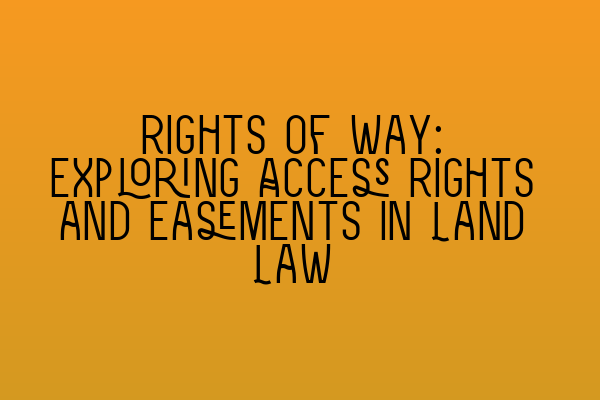Rights of Way: Exploring Access Rights and Easements in Land Law
Welcome to the SQE Property Law & Land Law blog! In today’s post, we will be delving into the intricate topic of rights of way and easements in land law. Whether you are a property owner, potential buyer, or simply interested in expanding your knowledge of property rights, this article will provide valuable insights into this important aspect of land law.
Understanding Rights of Way
Rights of way refer to the legal right for individuals to travel across a specific piece of land. This can be for various purposes, such as accessing a neighboring property or reaching a public road. In essence, rights of way allow people to pass through or use another person’s land, even if they do not own it.
In land law, rights of way are typically established through written agreements, such as deeds or contracts. These agreements can be specific to certain individuals or applicable to the general public. It is important to note that rights of way can also be created through long-standing use, known as “prescriptive rights.” This occurs when someone openly and continuously uses a pathway without objection from the landowner for a certain period of time, as defined by the law.
It is crucial for property owners and potential buyers to understand the extent of any existing or proposed rights of way over a property. By doing so, they can avoid potential disputes and ensure smooth land access for themselves and others.
Types of Rights of Way
Rights of way can be categorized into two main types: easements and profits. Let’s delve into each of these types:
1. Easements
An easement is a legal right that allows a person to use another person’s land for a specific purpose. This purpose is typically related to accessing a property or enjoying certain benefits, such as a view or sunlight. Easements can be either affirmative or negative:
- Affirmative easements: These easements grant the right to do something on another person’s land, such as walking, driving, or laying utility lines.
- Negative easements: These easements restrict the owner from doing something on their own land, such as building structures that would obstruct a neighboring property’s view.
Easements are usually created through written agreements, but can also be established through long-standing use or necessity. It is essential to ensure that any proposed easements are properly documented and registered to avoid future disputes.
2. Profits
Profits, also known as “profit à prendre,” refer to the rights to extract or use something from another person’s land. This could include rights to mine minerals, collect timber, or graze livestock on the land. Profits are less common than easements but can still be established through written agreements or long-standing use.
Resolving Disputes
While rights of way and easements are intended to facilitate land access and usage, disputes can still arise. Common issues may include disagreements over the extent of the right, unauthorized use, obstruction of the pathway, or changes to the land that affect the right of way.
If a dispute arises, it is advisable to seek legal advice from a property law expert. They can help assess the validity and extent of the right, negotiate with the parties involved, and, if necessary, represent you in court.
At SQE Property Law & Land Law, our experienced team is well-versed in resolving such disputes and protecting our clients’ rights. Visit our website to learn more or get in touch for a consultation.
Conclusion
Rights of way and easements play a crucial role in land law, providing individuals and communities with necessary access to properties and other benefits. Understanding the different types of rights of way and their establishment methods is essential for property owners, buyers, and anyone interested in property law.
For more insights into UK property laws, legal challenges in property transactions, navigating lease laws, and excelling in land law exams, check out our related articles:
- Updates in UK Property Laws: Key Changes and Implications
- Legal challenges in property transactions: A comprehensive guide
- Navigating Lease Laws in the UK: Essential Guidelines for Tenants and Landlords
- Dominate Property Law Questions: Avoiding Common Pitfalls
- Land Law Revision Tips: Ace Your Exam Preparation
Stay tuned for more informative articles on property law and land law, brought to you by the experts at SQE Property Law & Land Law. Feel free to reach out to our team if you have any questions or need professional assistance with your property matters.
